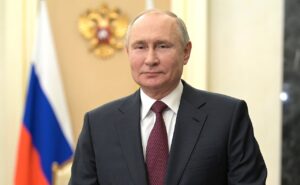Russian President Vladimir Putin’s upcoming meeting with Chinese leader Xi Jinping marks a significant moment in the evolving strategic relationship between the two countries. Announced on Tuesday, Putin’s two-day state visit to China begins Thursday, highlighting the growing importance of their alliance. This trip is notable as Putin’s first overseas engagement since commencing his fifth term in office last week.
This visit occurs amid Russia’s increasing dependence on China for economic and political support. The Kremlin aims to solidify its “no limits” partnership with Beijing, which is crucial given the current geopolitical climate.
Max Hess, a fellow at the Foreign Policy Research Institute, shared insights on CNBC’s “Squawk Box Asia,” stating, “It’s pretty clear that for these last two years, Putin has wanted three things from China.” According to Hess, these include a deal for the Power of Siberia 2 natural gas pipeline, enhanced Chinese support for Russia’s war efforts in Ukraine, particularly in terms of military hardware, and expanded access to Chinese financial markets to facilitate trade using the Chinese currency.
Despite these goals, Hess notes that there has been “remarkably little progress on all of those things,” suggesting that Putin’s visit is a critical attempt to secure these key concessions.
In an interview with state-media Xinhua ahead of his visit, Putin emphasized the rapid development of Russia-China economic and trade relations, showcasing their resilience in the face of external challenges. He also expressed support for China’s peace proposal regarding the Ukraine conflict, indicating Russia’s openness to dialogue.
Ukraine and its Western allies have not well received China’s 12-point plan for ending the Ukraine war, released over a year ago. Despite this, Putin’s commitment to the long-term presence in Ukraine remains firm, with Hess noting that the Russian leader is looking to “press his advantages” both on the battlefield and diplomatically at China’s backing.
Russian President Vladimir Putin’s upcoming visit to China, starting Thursday, underscores the deepening strategic ties between the two nations. This two-day state visit, the first since Putin began his fifth term in office last week, highlights the growing importance of their alliance in the face of increasing global pressures.
Amid the Kremlin’s reliance on China for economic and political support, Max Hess, a fellow at the Foreign Policy Research Institute, pointed out on CNBC’s “Squawk Box Asia” that Putin is seeking three specific concessions from China. These include securing a deal for the Power of Siberia 2 natural gas pipeline, gaining further Chinese support for Russia’s military efforts in Ukraine, and obtaining greater access to Chinese financial markets to facilitate trade using the Chinese currency.
Despite these ambitions, Hess noted there has been “remarkably little progress” on these fronts, making this visit crucial for Putin to push his agenda.
In an interview with state-media Xinhua, Putin emphasized the rapid development of economic and trade relations between Russia and China, showcasing their resilience against external challenges. He also expressed support for China’s peace proposal on the Ukraine conflict, indicating Russia’s willingness to engage in dialogue.
China’s proposal, a 12-point plan introduced over a year ago, has been poorly received by Ukraine and its Western allies. Nonetheless, Putin remains committed to a long-term presence in Ukraine, seeking to leverage China’s diplomatic and military backing.
Rising Pressure on China
China is also grappling with increasing pressure from Washington over its military support for Russia. The Biden administration recently imposed stiff new tariff rates on $18 billion worth of Chinese imports, aiming to protect American industries from unfair competition.
According to Ian Bremmer, political scientist and president of the Eurasia Group, this move signals to China that the U.S. intends to contain its influence regardless of the upcoming November elections. Bremmer commented, “Just look at Biden putting 100% tariffs on Chinese electric vehicle exports. All of this is sending a message to the Chinese that no matter who’s elected in November, that the U.S. is trying to contain them.”
Bremmer further suggested that the more pressure China faces from the U.S. and its allies, the closer its ties with Russia will become. This growing alignment between Russia and China could have significant implications for global geopolitics and economic stability.
